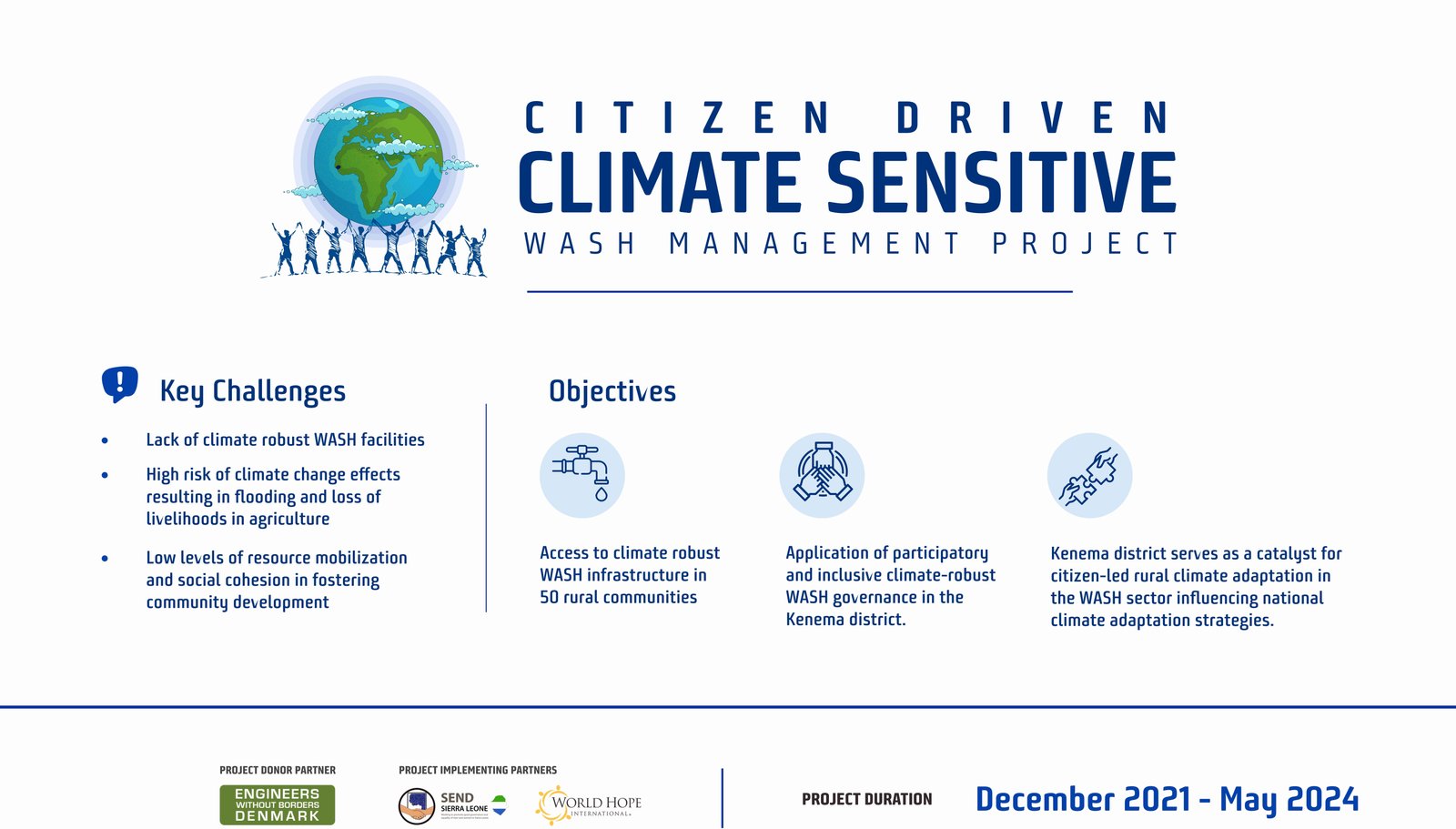

Reproduction of all or parts of this publication for educational or other non-commercial purposes is authorized without prior written permission from the copyright holders provided the source is fully acknowledged and any alterations to its integrity are indicated. Reproduction of this publication for sale or other commercial purposes without the prior written consent of the copyright holder is prohibited.
The project is funded and supported by Engineers without Borders-DK
Engineers without Borders-Denmark
Project Implementing Partner:SEND Sierra Leone & World Hope International
Project Location:Kenema District
Duration:December 2021 - May 2024
Project Budget:Le 2,194,153,833,33
Project Thematic Areas:WASH and CLIMATE RESILIENCE
Contact details and contact
Joseph Ayamga,
Country Director
SEND Sierra Leone
ayamga@sendseirraleone.com
+23 278 206 853
Sierra Leone is ranked as the third most vulnerable country in relation to the adverse effects of climate change due to a high level of multi-dimensional fragility. In 2018, after a Country Policy and Institutional Assessment (CPIA), Sierra Leone recorded a low score of 3.1 which indicated a 0.1 decline from the previous year. This fragility represents a high infrastructure debt stock, weak governance institutions, low human capacity and high youth unemployment estimated to be 70% among other factors. The Government and decentralized governance structure are aware of the fragility pressures but lack the capacity to adequately address these challenges thereby exacerbating the effects over time.
TWith 56.8% of the Sierra Leonean population living in poverty, 12.9% of the population living under extreme poverty and the food poverty rate standing at 54.5%, Sierra Leone faces considerable challenges in been able to achieve the Sustainable Development Goals (SDGs) 2030.The country ranks 182 out of 189 in the 2020 Global Human Development Index with a Human Development Index of 0.452 and life expectancy 54.7 years. The COVID-19 pandemic and its resultant lockdown effects has worsened the country’s economic recovery as it continues to suffer from the twin shocks of the 2014-2017 Ebola pandemic and the global commodity price slump.
TEven though water and sanitation are among the high priorities for the Government of Sierra Leone as stated in its National Development Plan 2019-2023, there has been very adoption of climate robust WASH. Changed weather patterns are recorded in 2017 to have resulted in an increasing number of wells being dry during parts of the year, a situation which has resulted in the increased incidence of outbreaks of cholera and water-borne diseases. Over a 17-year period access to water in rural communities has increased by 22% from 25% in 2000 to 47% in 2017, a statistic that needs to double in less than a decade to reach the SDG target of 100% in the year 2030.
There also a exists a poor culture in the maintenance of WASH facilities. According to statistics, it takes over a year for 28.9% of water system to be repaired and over a month for 60.5% of the water systems to be repaired. In rural communities where user fees the main source of revenue used to maintain water facilities; it was recorded that 89.4% of the population who have access to these water points do not pay for water.
In Kenema district, the incidence of extreme poverty affects 24.2% of the population, a statistic worsened by only 22% of the population having access to safe water mainly concentrated in the urban center of Kenema township. The district experiences excessive rainfall which destroys and/or leads to contamination of the scarce water sources, farmland and crops. The health risks induced by flooding, changed rain patterns, and insufficient WASH infrastructure puts additional pressures on the very fragile health system as water-borne disease and cholera outbreaks are annual recurrent incidents
The project seeks to improve livelihoods in Kenema district through improved water and sanitation in rural communities in the district. By encouraging and capacitating rural communities and district structures to participate in the adoption of climate adaptive responses, the project will address low institutional capacity from a bottom approach and directly impact the population in 50 communities. It will promote cross-sector partnerships by placing civil society as the principal agent of change working with WASH sector governance institutions and the private sector. The project will also improve the knowledge base, develop a shared platform for action from the local level and establish citizen-driven examples of best practices in making the livelihood of the population in the Kenema district more resilient.
Improved livelihood in Kenema district through cross-sector engagement in climate-sensitive WASH governance
01
350
02
50
03
30
04
15
05
10
06
20
SEND Sierra Leone is non-governmental organization registered with the Ministry of Finance and Economic Development of the Republic of Sierra Leone with a vision to contribute to a Sierra Leone where people’s rights and well- being are guaranteed. SEND Sierra Leone is part of a West African structure with a headquarters in Ghana and offices in Liberia and Sierra Leone where approaches and experiences are shared. SEND Sierra Leone is an independent structure, a local NGO registered in Sierra Leone with a local Board, which has its own project portfolio and budget separate from Ghana.
SEND’s portfolio includes community development, WaSH, health, nutrition/agriculture and women’s empowerment. Intervention areas are in the districts of Kailahun, Kenema, Kono, Western Areas Urban, and Rural districts and more recently, the district of Bonthe.